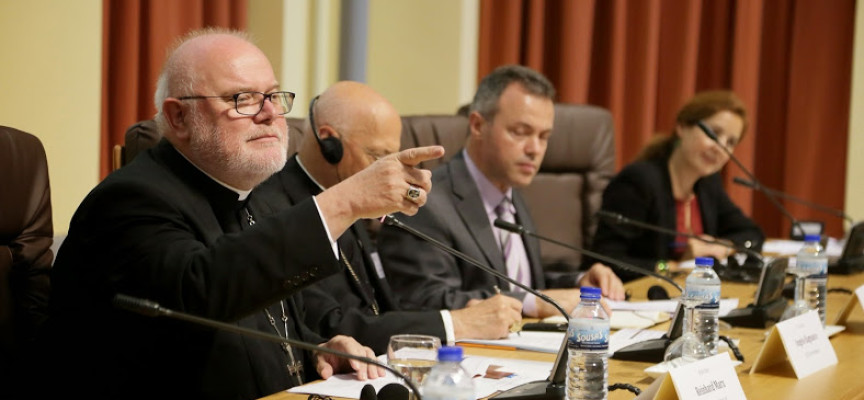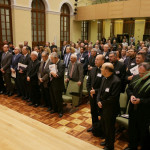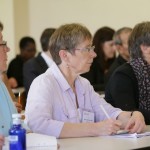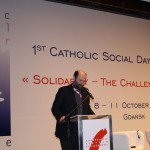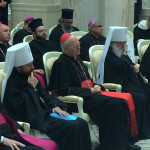What contribution can the Church make towards a social Europe? The Church does not have any technical solutions up Her sleeve. She also has no political or economic concepts of Her own which could compete with the political arena. The Church however partakes of the concerns and the needs of the people, as She has been placed in this world. This is why it is not the job of the Church to develop solutions in the technical field to make improvements with regard to individual issues. (…)
The social doctrine is therefore a holistic concept focussing on people and their dignity, and not instrumentalising them. Taking its principles of personality, solidarity and subsidiarity as an orientation allows us to establish a societal system which is not one-sidedly orientated towards economic issues, but places the focus on its individual members.
Catholic social doctrine however includes not only the social proclamation of the Pope and of the bishops. The Church’s teachings, rather, form only one out of three pillars. A second is constituted by the academic study of social ethics at the theological faculties. The third, in turn, has been for many years the Catholic social movement.
It is particularly in this field that I am therefore urgently calling for Catholic lay people to make their voices heard in European policies and to proclaim and stand for the Church’s social doctrine in the political arena. The effectiveness of the Church’s social doctrine primarily also depends on whether Christians are found who commit to the community of Europe and engage in Christian social political activity. The networking of the Catholic laity in the political arena all over Europe is certainly a field in which we as a Church must become more involved.
When the Presidents of the European Commission and of the European Council, José Manuel Barroso and Herman Van Rompuy, as well as the Vice President of the European Parliament, László Surján, met on 10 June of this year to engage in a dialogue with religious leaders, President Barroso described his initiative to bring European intellectuals together to discuss the new “Narrative for Europe”. What this stands for is the idea that the peace-based reasoning of European integration is no longer sufficient, almost seventy years after the end of the Second World War. Many people are of the opinion today that combining the economic, social and political strength of Europe in a globalised world is the new reason why states in Europe should work together.
In the statement which I held at this meeting in Brussels, I pointed out that Robert Schuman already attributed the need for European integration not only to the logic of peace and reconciliation, but also to Europe’s self-assertion in the world. I consider both of these reasons to remain equally topical today. If we wish to not only defend the European social model in a world that is coming closer together in economic terms, but also to promote it worldwide, we Europeans have no other option than to work closer and closer together and to uphold our common interests together.
Particularly in this commemorative year 2014 – 100 years after the start of the First World War – we should however also not forget the peace-based motivation. Jean-Claude Juncker, the new President of the European Commission, tends to say: “If you have any doubts about Europe, you should visit a military cemetery.” (…)
Let us therefore not forget that the existing European interconnections are also a reason why we in Europe not only live in peace, but that we live together as friends. Europe remains a project of peace, freedom and reconciliation – also and particularly in this year 2014, which is so difficult in terms of foreign policy. Europe’s social dimension is a major contribution towards learning the lessons of history, and reinforcing this project of European unification. As Christopher Clark said in Salzburg, social Europe as one constituent element of an order based on peace is without a doubt “one of the greatest achievements of the history of mankind”.
Card. Reinhard Marx, President of Comece
Quale contributo può dare la Chiesa per un’Europa sociale? La Chiesa non ha alcuna soluzione tecnica. Non ha neppure concetti politici o economici propri con cui competere nell’arena politica. La Chiesa tuttavia partecipa alle preoccupazioni e ai bisogni della gente, essendo nel mondo. Questo è il motivo per cui non è compito della Chiesa sviluppare soluzioni in campo tecnico per arrivare a miglioramenti nelle singole questioni individuali. (…)
La dottrina sociale è pertanto un concetto olistico che si concentra sulle persone e sulla loro dignità, e non le strumentalizza. Facendo suoi i principi di personalità, solidarietà e sussidiarietà come un orientamento per permetterci di stabilire un sistema sociale che non sia unicamente diretto alle questioni economiche, ma metta a fuoco i singoli membri.
La dottrina sociale cattolica comunque include non solo le proclamazioni in campo sociale del Papa e dei vescovi. Gli insegnamenti della Chiesa, piuttosto, sono solo uno dei tre pilastri. Un secondo è costituito dagli studi accademici di etica sociale nelle facoltà teologiche. Il terzo, a sua volta, è stato per molti anni il Movimento sociale cattolico.
È in particolare in questo campo che, pertanto, chiamo urgentemente i laici cattolici a far sentire la loro voce nelle politiche europee e a proclamare e sostenere la dottrina sociale della Chiesa nel dibattito politico. L’efficacia della dottrina sociale della Chiesa dipende anche, primariamente, da cristiani che s’impegneranno nella comunità dell’Europa e nelle attività cristiane politico-sociali.
La rete di laici cattolici nell’arena politica di tutta l’Europa è certamente un campo in cui noi come Chiesa dobbiamo essere più coinvolti.
Quando i presidenti della Commissione europea e del Consiglio europeo, José Manuel Barroso e Herman Van Rompuy, così come il vice presidente del Parlamento Europeo, László Surján, si sono incontrati il 10 giugno di quest’anno per dialogare con i leader religiosi, il presidente Barroso ha illustrato la sua iniziativa di riunire gli intellettuali europei per discutere di una nuova “narrativa per l’Europa”.
Nella pratica questo significa che l’idea della pace come ragione dell’integrazione europea non è più sufficiente, quasi settanta anni dopo la fine della Seconda guerra mondiale. Molte persone sono dell’opinione oggi che combinare il rafforzamento economico, sociale e politico dell’Europa nel mondo globalizzato sia la nuova ragione perché gli Stati in Europa dovrebbero lavorare insieme.
Nella dichiarazione che ho tenuto in questo incontro a Bruxelles, ho detto che Robert Schuman già attribuiva la necessità dell’integrazione europea non solo alla logica della pace e della riconciliazione, ma anche all’autoaffermazione dell’Europa nel mondo.
Ritengo che entrambe queste ragioni debbano rimanere ugualmente centrali oggi. Se noi vogliamo non solo difendere il modello sociale europeo in un mondo che sta diventando economicamente più interconnesso, ma anche promuoverlo nel mondo, noi europei non abbiamo altra opzione che quella di lavorare maggiormente insieme e di portare avanti i nostri comuni interessi insieme.
Particolarmente in questo anno di commemorazioni 2014 – a 100 anni dall’inizio della Prima guerra mondiale – dovremmo comunque anche non dimenticare le motivazioni alla base della pace. Jean-Claude Juncker, il nuovo presidente della Commissione europea, è solito dire: “Se avete qualche dubbio sull’Europa, dovreste visitare un cimitero militare”.
Pertanto non dimentichiamo che le interconnessioni esistenti in Europa sono anche una ragione per cui noi, in Europa, non solo viviamo in pace, ma viviamo insieme da amici. L’Europa rimane un progetto di pace, libertà e riconciliazione – anche e in particolare in questo 2014, che è così difficile in termini di politica estera. La dimensione sociale dell’Europa è un contributo maggiore per imparare la lezione della storia e rinforzare il progetto di unificazione europea. Come disse a Salisburgo Christopher Clark, l’Europa sociale come un elemento costituente di un ordine basato sulla pace è senza dubbio “uno dei più grandi traguardi della storia dell’umanità”.
Card. Reinhard Marx, presidente Comece

